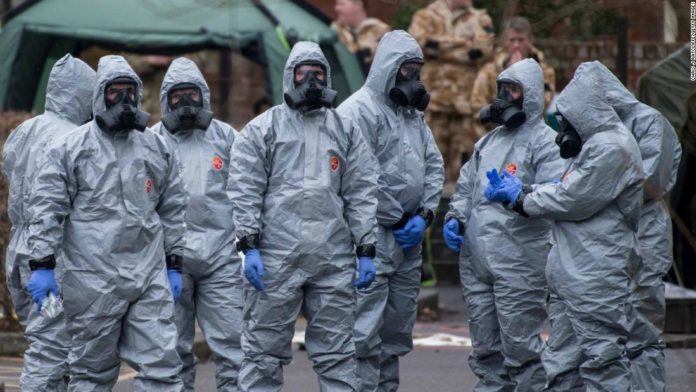Vil Mirzayanov, the former chemist, was the head of the technical counterintelligence department in the Soviet era. By his own admission, his aims back then were to prevent other intelligence services from developing Novichok. In an interview, he said, “We were trying to keep it a secret for a long time.”
Mirzayanov said Novichok is up to 10 times as potent as VX, the nerve agent used to kill the brother of North Korean leader Kim Jong Un last year. Mirzayanov blew the lid on the Novichok creation in the mid-1990s, at a time when a chemical weapons convention treaty was being negotiated. Russia felt it might be able to skirt the conventions with Novichok by omitting it.
One of the many outstanding questions about the Skripal incident is how Novichok could have been administered and what form it came in. “An attacker should be very well educated and a trained person,” Mirzayanov said, adding the nerve agent could be “produced before the attacks, a couple of minutes before. After that it is ready to use” and could come in a spray form.
Finding the components to make Novichok are not hard, he said. “Secondary binary components can be produced everywhere” and less poisonous components can be combined to produce the final product. Those components could have been brought into the UK separately, he said and the poison created just before being used.
However, Mirzayanov said, to make the poison would have required “the knowledge of people who were working at this factory” in Russia.
The chemist said Novichok, which means newcomer in English, was developed for use on the battlefield, but he said, “I know we worked for more mobile versions of using of this weapon.”
Mirzayanov said the chances of surviving Novichok might be limited. “My good friend was working on this binary version of this Novichok gas. He was exposed to some concentrations and poisoned. They saved him for a while, but ultimately, he died. It is an incurable, incurable disease.”
Mirzayanov was imprisoned in the 1990s for blowing the whistle on Russian and Soviet chemical development activities that he felt were a “criminal enterprise.”
Russia kept the Novichok virus off the Chemical Weapons Convention list to continue developing new strains, he said. “Russia used this chemical weapons convention, destroying already aged, old weapons, keeping intact this new generation.”
Mirzayanov, now 83, living in New Jersey and married to an American, recalled that “slowly over time I came to the conclusion that I was participating in this criminal enterprise. And after that, I decided to go to the public with revelations. From this time I am fighting against Novichok, to put it under international control — but without any success.”
The lack of any international control has led to an international incident, so perhaps Mirzayanov is a step closer to his wish.
Source : Nbcnewyork











